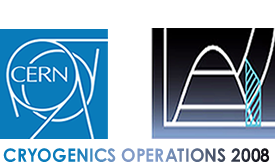Speaker
Mr
K V Srinivasan
(Tata Institute of Fundamental Research)
Description
The low temperature facility (LTF) of Tata Institute of Fundamental Research, (TIFR) Mumbai, India, has been operating and maintaining helium liquefiers and nitrogen generators for more than four decades. For the past sixteen years, helium is liquefied in KOCH’s model 1610S helium liquefier (production during 2007: 60000 ltrs). A new helium liquefier (Linde L280) has been recently commissioned in June 2008. The facility also produces liquid nitrogen using a LINIT-25 and occasionally a Philips model PLN-430 plant with air separation column.
Liquid helium is dispensed to about 37 research laboratories including dilution refrigerator, adiabatic de-magnetization (for development of micro-kelvin refrigerator) and three NMR spectrometers. Many systems are kept cold continuously. TIFR has a large network of helium gas recovery lines (~1.6 km) and our recovery rate is about 80% to 85%.
We will present our experience in helium liquefier operation and maintenance, highlighting aspects such as: improved method to operate purifier with pre-cooling in impure mode, liquefier decontamination with quick and simple method, cold box vacuum valve modification, recovery of liquefier blow down helium gas, shifting-re-installation and commissioning of KOCH liquefier in ten days, repair and revival of cryogenic dewars, development of ‘on-line’ cryogen request form, helium gas accounting methods etc. Some details related to the recent installation of a helium liquefier (Linde L-280, including 5000 liters storage dewar with submersible liquid pump), which resulted in efficient commissioning within two weeks, will also be discussed.
| Proposed for workshop session (see call for abstracts): 1- Operation 2- Maintenance 3 - Safety 4 - Control | 1-Operation |
|---|
Author
Mr
K V Srinivasan
(Tata Institute of Fundamental Research)
